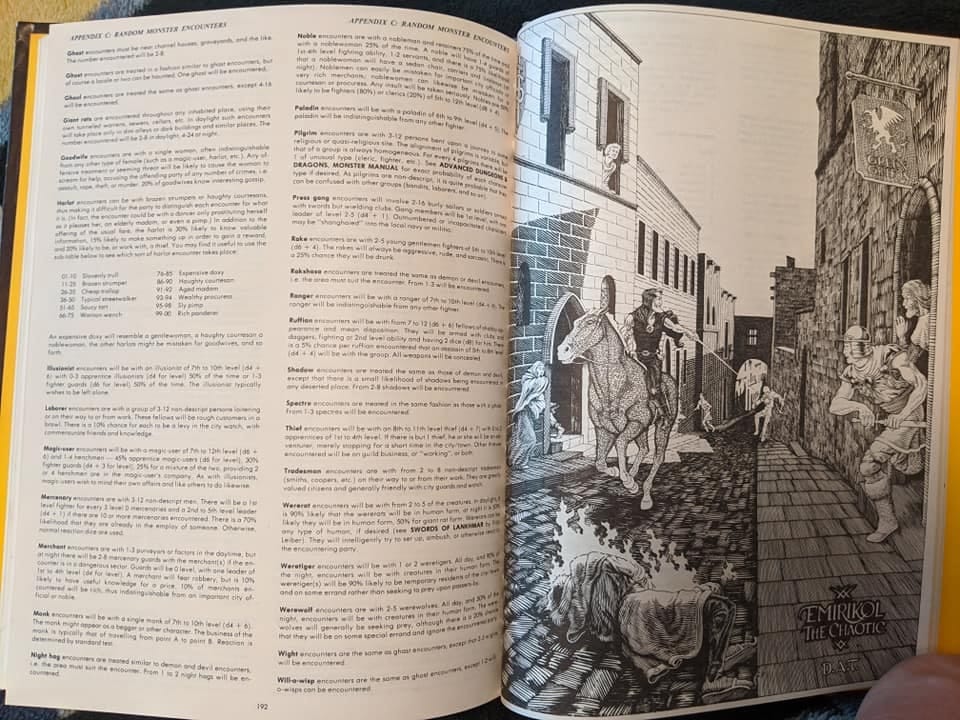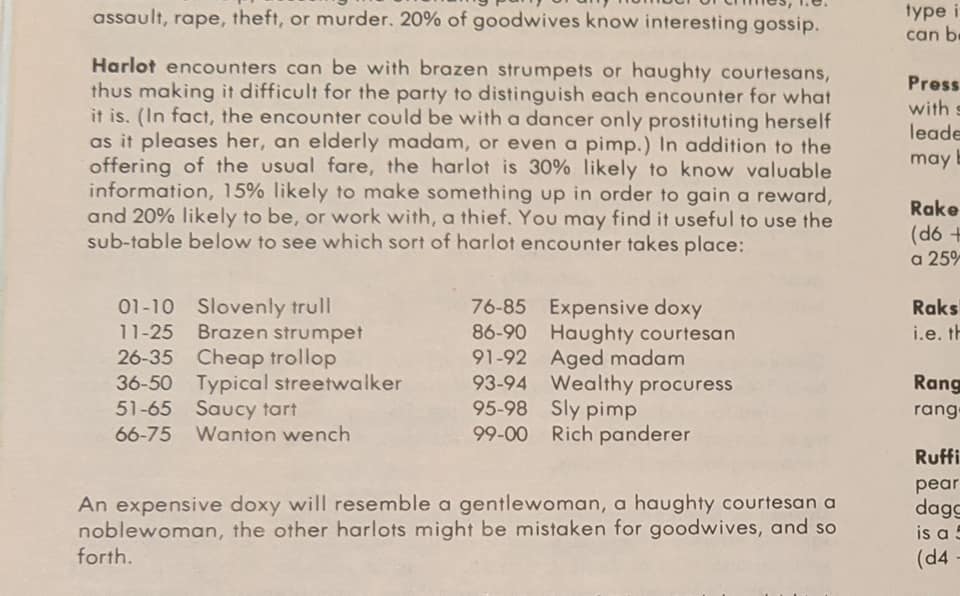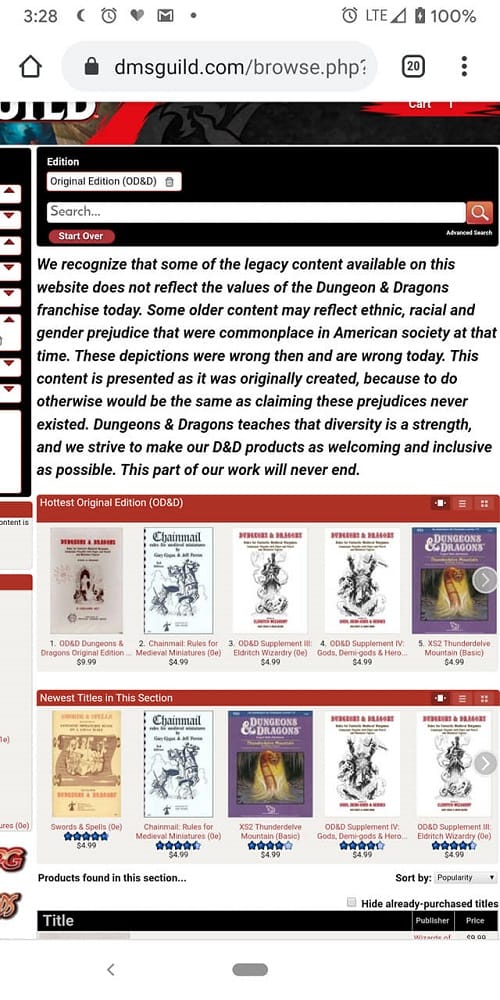Demanding Answers on the Harlot Table in the Dungeon Masters Guide
Emirikol the Chaotic, by Dave Trampier. From the Dungeon Masters Guide (TSR, 1979)
So. Some of my older gentlemen friends are feeling upset and disenfranchised by Wizards of the Coast’s disclaiming of the values and mindsets of early D&D. It feels like a betrayal to them, for what I’m sure is a variety of reasons.
But I have, on more than one occasion, wanted to share this iconic illustration from the 1st edition Dungeon Masters Guide with kids in my middle school club and stopped. Because I remember the steel in my daughter’s eyes as a preteen, squinting at the facing page and saying, “Hey, what’s that?”
Pointing, of course, to the obligatory harlot table. “How come there are 10 extra ugly terms for women in the harlot table, but nothing for mercenaries, thieves, nobles, or tradesmen?” Cocked eyebrows that demanded to know why I would accept this rubbish at all.
And along with my chagrin, pride. I taught her to ask those questions and I am delighted that she and this next generation of girls are demanding the answers. I’m glad all the marginalized kids are demanding an equal place at the table. Most of all, I am thrilled that kids still want to play these games at all.
These games are wonderful, but there are a lot more inclusive alternatives available. Wizards of the Coast’s response to the old material is perfectly balanced and appropriate. It is absolutely necessary if they want to keep their games alive for future generations. They won’t stand for the inescapable undercurrents of racism and sexism that were taken for granted in the old material. They don’t have to.
When I first posted these thoughts, I struck a nerve among fans of the original D&D who were working out their own relationships with that material. Some with viewpoints far removed from mine seemed to feel attacked or defensive. For clarity in conversation I added the following elaboration.
I guess what I really wanted to share was that until I had my own daughter, and now this legion of kick-ass middle-school girls in my club, I had rolled my eyes so much at that puckish nerd humor of the old days that I went blind in the same spots.
Gamer kids showed me where I needed to sharpen my feminist game. And yet they still love me and love the games and know this corner of our world is a safe and fun space.
That ten years of my gaming experience has been the best of my life because it’s worth sharing with all these awesome kids. I just want the old guard who feels attacked by the changing values to recognize they don’t have to shelter in place with the bitter edgelords.
So I will let go of the shame I felt, called out on my complicity in my own dehumanization, and I will represent what I think is best in the old guard. The joy of play, the celebration of whimsy, and the fellowship at the table. I hope the older gentlemen will come with me.
Suzanne Anderson is a long-time gamer and schoolteacher who has run an adventure gaming club at the middle school where she’s taught for the last ten years.



Dear Ms. Anderson,
Congratulations on your 10 years of gaming with the middle schoolers! And on your ability to hear what they have to say, which is a lot of things that us old-timers needed to hear for years and years.
I understand the argument made about how we are just simulating the medieval world in which the game is set, where some collection of street encounters could be characterized by such a brazen strumpet of a table. But we are not exactly devoted to reality, are we, when we toss in monster-filled, multi-level dungeons and a rainbow’s worth of dragons of color? So, painful artifacts like the Harlot table can and should be excised without causing any concern, even to the sly pimps of the gaming world.
Keep up the good fight and the great gaming!
I think Wizards of the Coast made a huge mistake. They pandered to a few people who I think many would agree were just ‘professional complainers’ hoping for a chance to use social issues to further themselves. “Beatniks out to make it rich” per a classic Donovan song. Most old school gamers are very angry at this and I’m sure they’ve lost more customers than they gained. There are plenty of similar but different sets out there and its not like the ‘comic/gaming store’ is the only practical outlet with today’s tech. Real “Old School Gamers” learned from the 80s they had to fight tooth and nail for their hobby – being an easy target for Fundiez and cheap political panderers. TSR even got hassles from gamers when they removed Demons, Devils and Assassins from the main books and changed it back later.
Beyond that, D&D was always progressive for its time. Sure, it was written for 99% of its customer base; White Males. You didn’t have to pass a “Nordic Superman” test to buy it and most of said customer base was politically “Liberal” pretty much having to be to have time for/parents allowing such a hobby in the first place. And the company did make very sensible and sincere attempts. Note the original Oriental Adventures was well researched at the time “The Japanese are buying everything!” was all over popular culture and you still saw “Fu Manchu” on weekend movies right after Saturday Morning cartoons. And they really went nuts for “Al Qadim” an “Arabian Nights” style settings… To avoid kids/adults using a bunch of Islamic phrases they made up “The faith of the Loregiver” 90% Islam but different world so no “In the name of …. I tell this tale for there is no G— but…” from kids just quoting Arabian Nights but… This again at a time when 99.9% of American’s exposure to Arab/Muslims were terrorists on the news or the stories of decadent Oil Sheiks like on the crumbling “Men’s Adventure” magazines of that barbershop your Grandpa dragged you to.
Censoring an old book – even with a pathetic, token “Disclaimer” is a bad move. If – IMO – the complainers bothered to listen to anyone but their friends on their whining YouTube videos – they’d have known what I said from many voices. IMO, like other ” – out to strike it rich..” people hoping for a ‘consulting’ job on video games I’m sure they only took any voice not agreeing with their own as harassment/threats. Also it did NOT appease said complainers – you give as such an inch they’ll hate you for not already giving them a mile. And what COULD WoTC do? Remove the books and censor them? Huge loss of money and return to online/torrent/usenet trading + flight to alternative platforms. “Hire” them as “Consultants”? Yeah, they’d sure help them get customers – being obviously sarcastic but I think I’m correct. IMO they should have ignored them, no statement, even released things a bit ‘edgy’ to jab them in the virtual eye.
I think you articulate your position well, and as a 40-year player, I see lots of what you’re talking about.
However, the idea that WotC is making a poor business move doesn’t really stand up. The older players that enjoy the older editions of the game–which again, I am one of–already have their materials, and access to any number of facsimiles and pastiches. The legacy material is not a significant share of the D&D market. The game is hugely popular among younger people who aren’t really interested in looking at the old material, anyway.
The disclaimer is there to protect D&D’s standing as the 800 lb. gorilla in the RPG world. Kids have lots of alternatives. They will reject a brand that has a stain on it. The kids are the ones pointing out the older material is stained. The kids are driving the market. WotC can respond to the market or go under, like TSR did. It’s a perfectly reasonable move.
For folks that aren’t interested in playing with the new rules or with the kids that love them, there’s never been a better time to be a gamer. The old editions of the game are available. There is a whole OSR niche in the hobby gleefully churning out material in the old paradigm. It’s an awesome opportunity to enjoy your friends and continue having fun. And for the kids who love the new material, the same. It’s the same amazing fun it’s always been.
I don’t see it as anything but a win-win for everyone that loves gaming.
https://www.washingtonpost.com/entertainment/how-dungeons-and-dragons-somehow-became-more-popular-than-ever/2019/04/18/fc226f56-5f8f-11e9-9412-daf3d2e67c6d_story.html
I edited the 1E Dungeon Masters Guide. I thought the Harlot encounter table was embarrassing and juvenile, but I was 23 years old, doing the very first task assigned to me by Gary Gygax, and I didn’t feel even slightly empowered enough to tell Gary I thought that kind of content should be edited out. I’ve been sorry ever since. Later on during my time at TSR I grew more confident about drawing a red line through that sort of foolishness, but in February of 1979 I wasn’t there yet.
And just so we’re clear: Making a book available in its original form, and providing a disclaimer beforehand, is the exact OPPOSITE of censorship.
Dear Mr. Schick,
Thank you for all the work that you did complete on the 1e Dungeon Master’s Guide. Having struggled to make sense out of the “white box” OD&D edition, 1e AD&D was waaay less confusticating! Plus, the artwork, as Ms. Anderson points out, is worth the price of admission. If it had its share of “warts”, well, most of us were pretty acne-splattered back in 1979.
Have to say a bit here. While I never really played AD&d 1st or 2nd ed in much depth so had no knowledge of this table, it really comes to me as more of a attempt at humour rather than anything to have been taken seriously. This form the guy who had/has a Serving Wench starting career for RuneQuest 3rd ed rules on his website. In no way to be nasty rather to simply put some other viable starting place where someone could logically enter into an adventure from. Come on think of it, Conan has buxom wench on knee as he guzzles wine and boasts about the bit of burgling he plans to do later that night in Shadazir the Wicked, and she says “Hold on, that sounds like fun, I am coming with!” and before you know it you have a wee party going and adventure at hand.
Hey some will say misplaced, others will jump on the bandwagon so their pathetic voice can be heard nasally whining about the unfairness of it all, some wont get the humour, some will laugh and embrace it. but I fully agree with Green here, let the punters chose. It is what it is, a snapshot in time form a different decade where people had different expectations tastes and challenges.
@ GreenGestalt. Welcome back, I missed your osts. I don’t hang out much online, bar here, so do tell, what is the orc issue. Please don’t tell me someone is trying to draw parallels to various earthly groups and use such “findings” as some sort of empirical evidence of X Y or Z in RPG’s (I cant even bear to be more specific.)
Just to let Wizards of the Coast put it in their own words, here is the bulk of their statements about how they intend to re-design D&D for a greater expression of diversity in PCs and NPCs:
“Throughout the 50-year history of D&D, some of the peoples in the game—orcs and drow being two of the prime examples—have been characterized as monstrous and evil, using descriptions that are painfully reminiscent of how real-world ethnic groups have been and continue to be denigrated. That’s just not right, and it’s not something we believe in.
Despite our conscious efforts to the contrary, we have allowed some of those old descriptions to reappear in the game. We recognize that to live our values, we have to do an even better job in handling these issues. If we make mistakes, our priority is to make things right.
Here’s what we’re doing to improve:
We present orcs and drow in a new light in two of our most recent books, Eberron: Rising from the Last War and Explorer’s Guide to Wildemount. In those books, orcs and drow are just as morally and culturally complex as other peoples. We will continue that approach in future books, portraying all the peoples of D&D in relatable ways and making it clear that they are as free as humans to decide who they are and what they do.
When every D&D book is reprinted, we have an opportunity to correct errors that we or the broader D&D community discovered in that book. Each year, we use those opportunities to fix a variety of things, including errors in judgment. In recent reprintings of Tomb of Annihilation and Curse of Strahd, for example, we changed text that was racially insensitive. Those reprints have already been printed and will be available in the months ahead. We will continue this process, reviewing each book as it comes up for a reprint and fixing such errors where they are present.
Later this year, we will release a product (not yet announced) that offers a way for a player to customize their character’s origin, including the option to change the ability score increases that come from being an elf, a dwarf, or one of D&D’s many other playable folk. This option emphasizes that each person in the game is an individual with capabilities all their own.
Curse of Strahd included a people known as the Vistani and featured the Vistani heroine Ezmerelda. Regrettably, their depiction echoes some stereotypes associated with the Romani people in the real world. To rectify that, we’ve not only made changes to Curse of Strahd, but in two upcoming books, we will also show—working with a Romani consultant—the Vistani in a way that doesn’t rely on reductive tropes.
We’ve received valuable insights from sensitivity readers on two of our recent books. We are incorporating sensitivity readers into our creative process, and we will continue to reach out to experts in various fields to help us identify our blind spots.
We’re proactively seeking new, diverse talent to join our staff and our pool of freelance writers and artists. We’ve brought in contributors who reflect the beautiful diversity of the D&D community to work on books coming out in 2021. We’re going to invest even more in this approach and add a broad range of new voices to join the chorus of D&D storytelling.
And we will continue to listen to you all. We created 5th edition in conversation with the D&D community. It’s a conversation that continues to this day. That’s at the heart of our work—listening to the community, learning what brings you joy, and doing everything we can to provide it in every one of our books.
This part of our work will never end. We know that every day someone finds the courage to voice their truth, and we’re here to listen. We are eternally grateful for the ongoing dialog with the D&D community, and we look forward to continuing to improve D&D for generations to come.”
“How come there are 10 extra ugly terms for women in the harlot table, but nothing for mercenaries, thieves, nobles, or tradesmen?”
There are plenty. Just check out the level titles for PC classes in the Player’s Handbook. It’s flavorful, but also silly, and one of the many tiny quirks of D&D that 2e was wise to abandon. Gary must have reached for the thesaurus five times while writing each paragraph. Where else will you read the words “feign”, “fain”, and “fane” used in correct context? Or words like “puissant”, “lucubration”, and “perspicacious”?